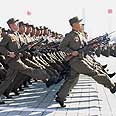
Between Syria and North Korea
Our focus should be on Syrian question, not North Korean nukes
Our dear government is not drawing the right conclusions from what the ruling military sect in the northern part of Korea has done. This region, called the Democratic People's Republic of Korea, is not a state.
It is an impoverished geographic region forcefully taken over by a communist terror group who turned it into one of the poorest regions in the world and is now trying to use nuclear extortion to gain minimal international recognition.
This recognition must not be granted. North Korea is nothing but a massive concentration camp whereby some 23 million residents are being incarcerated by guards who ought to be handcuffed and tried for crimes against humanity.
Its rule hinges on persecution, ethnic cleansing, repression and deliberate starvation of millions of human beings. To emancipate Korea's impoverished peoples from the inhumane suffering they are experiencing, the international community should impose more severe sanctions on the communist sect and by so doing accelerate its downfall.
Korea's downfall within 24 minutes
Without communist dictatorship East Germany collapsed as a state within 24 hours. North Korea, without its red regime of terror, will disappear as a state within 14 minutes. An influx of millions would flock to the borders of the wealthy capitalist south.
And what about the nuclear threat? At this stage North Korea still doesn't have a nuclear arms system in place and it is doubtful whether it ever will. The nuclear test the military conducted this week under the banner of a "Nuclear Explosion" either failed miserably or wasn't nuclear at all.
Even if the test had succeeded, Korea's nuclear armament is still far off and very difficult to achieve: It entails expenses totaling billions of dollars while the GDP of what is known as North Korea totals seven to eight billion dollars, less than the GDP of an Israeli city. Could Haifa possibly achieve nuclear capability?
The North Korean threat, therefore, is unfounded – at least until a (very) wealthy country - willing to invest vast funds and technology in North Korea's human and geographic expanse - is found.
Iran may be such a country. It may, but it is not certain. The vast expanse between the deranged Stalinist worldview of North Korea's regime and the fanatic Islamic rule of Teheran is hard to bridge.
Religious clerics and leaders of Iran's Revolutionary Guard cannot rely on the deranged minds of North Korea. And the rift is even greater considering North Korea's repressed peoples and the Iranian public that is educated, vibrant, open to the West and ready to topple its unpopular regime.
But history has shown that depraved regimes often sign irrational pacts against all odds.
And that's how we come back to the Israeli problem. As Israel is the primary target of Iran's threats, we are the most fearful of a nuclear pact between North Korea and Iran. This explains the screaming headlines in the media such as "North Korea will arm Iran", or "Yesterday it was North Korea – tomorrow Iran." Tomorrow? Haven't we gone a bit too far?
There is, however a possibility for an immediate Israeli operation against the conspirators in Iran: Negotiations with Syria on a peace settlement.
Peace in exchange for Golan
On Tuesday, a day after the alleged nuclear event in Pyongyang, the Syrian president made some outstanding statements in an interview he gave the BBC. Syria, said Assad, is willing to live in peace, harmony and in mutual recognition with the State of Israel.
In the interview, as in other speeches and statements, he didn't mention the Palestinians, the West Bank or Jerusalem. He is prepared for comprehensive peace in exchange for the Golan. Period.
A peace agreement with Syria would likely strike a heavy blow at Teheran's current regime and hasten its demise. An Israeli-Syrian peace agreement would pull the rug from under the feet of the established terror organizations in Damascus; help get the Palestinians back on a saner path and leverage the pursuit of comprehensive Israeli-Arab peace.
Almost all of the defense establishment's elite advocates entering negotiations with Syria and is prepared to deal with the consequences. This is the greatest national decision facing the Olmert administration.
It is this, and not changing Israel's parliamentary system. There's something rather distorted in the Israeli public debate if the North Korean issue takes precedence over the Syrian question.










